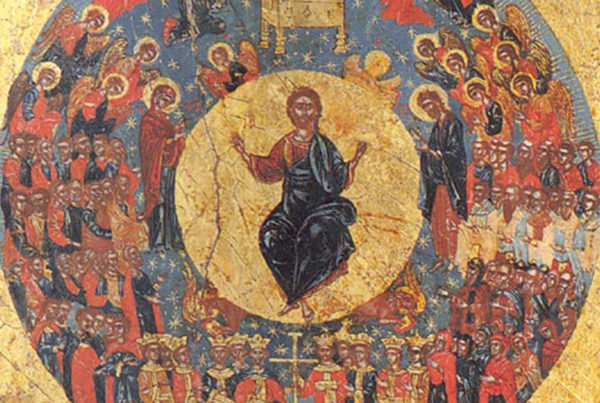I have a very complex (and often stormy!) emotional life. Laughter, tears, and deep longing… all of that can happen in the first 15 minutes of my day. It can be exhilarating… and exhausting.
Over the years I have found that the life of self-discipline which Christianity entails is a great help in this regard. Daily, weekly, and monthly practices of self-denial and engagement with God keep my emotional life much steadier than it would have been otherwise, and oriented in the right direction: the love of God and neighbor.
It is often thought by outsiders that Christianity with its many repudiations of the “flesh” is an enemy of the emotional life. That because it says “no” to limitless self-expression, it also thereby destroys personhood.
But this is contrary to the facts. Christianity, at its best, is not inimical to personhood. Instead, with its insistence that the cross is the path to true life, Christianity proves itself to be the only genuine hope for the flourishing of our personhood–and with it, our emotional life.
Thomas Merton provides a particularly good account of this in chapter two his little book Thoughts in Solitude. There he wrestles with the importance of the ascetic life for purifying temperament and emotion and thereby strengthening our personhood.
Merton contends, first, that temperaments (and all that goes with them–emotion included) are a gift from God which must be stewarded wisely.
All temperaments can serve as the material for ruin or for salvation. We must learn to see that our temperament is a gift of God, a talent with which we must trade until he comes…If we make good use of what we have, if we make it serve our good desires, we can do better than another who merely serves his temperament instead of making it serve him (p. 22).
The key point is that we must make our temperaments “serve our good desires.” Temperament is not master, but slave. When we learn to love the right things (which tells us what kind of person we are, whether evil or virtuous), our temperament will begin to come in line.
Merton is honest about the fact that our choices are influenced by many factors both inside and outside of us. That is, the path to aligning our temperament with good ends is fraught. Our upbringing, our dispositions, the circumstances in which we are embedded… all of it influences our choices. Nevertheless, he asserts:
Coercion from the outside, strong temperamental inclinations and passions within ourselves, do nothing to affect the essence of our freedom. They simply define its action by imposing certain limits on it (p. 23).
In other words: as long as we are “sane”, he says, we remain free, whatever our circumstance, to act against our inclinations and towards our ideal of the good. Merton, it should be noted, is no Pelagian here. He will later give a brief account of the role of grace in this process of choosing towards the good.
In the meantime, he gives an example of a man with a fiery, prone-to-anger temperament:
If he desires what is good his temper can become the controlled instrument for fighting the evil that is in himself and helping other men to overcome the obstacles which they meet in the world. He remains free to desire either good or evil (p. 24, emphasis mine).
The point, again, is that we do not need to be dictated by our passions. Our temperaments, under the influence of grace, can become servants of the good.
In all of this it should be clear that Merton does not believe that that Christianity and its life of self-discipline implies a nullifying or destroying of temperament, passion, or emotion. “Christianity is not stoicism,” he writes. “The Cross does not sanctify us by destroying human feeling. Detachment is not insensibility.” He goes on:
Too many ascetics fail to become great saints precisely because their rules and ascetic practices have merely deadened their humanity instead of setting it free to develop richly, in all its capacities, under the influence of grace (ibid.)
The person of Christ is the ground and exemplar here. Jesus, the God-Man:
…enjoyed at the same time and without conflict the Clear Vision of God and the most common and simple and intimate of our human emotions (pp. 24-25).
Human emotion organized perfectly towards the “visio Dei”–that is the goal, for Merton.
So, how do we get there? By the self-denial that characterizes the ascetic life. “The control of emotion by self-denial tends to mature and perfect our human sensibility,” he writes (p. 25, emphasis mine).
Self-denial, of course, implies deprivation, and this will inevitably involve a certain assault on sensibility at times. We will feel as though our emotions are being deadened by self-denial. But this is part of the process, part of the purifying fire. Merton says, poignantly:
We must suffer. But the attack of mortification upon sense, sensibility, imagination, judgment, and will is intended to enrich and purify them all. Our five senses are dulled by inordinate pleasure. Penance makes them keen, gives them back their natural vitality, and more. Penance clears the eye of conscience and of reason. It helps us think clearly, judge sanely. It strengthens the action of our will (pp. 25-26; emphasis mine).
So, the life of self-discipline, of “mortification”, actually gives us back our emotions and senses, organizing them towards their supreme goal: love of God and neighbor. But it does more than that:
Penance also tones up the quality of emotion; it is the lack of self-denial and self-discipline that explains the mediocrity of so much devotional art, so much pious writing, so much sentimental prayer, so many religious lives (p. 26; emphasis mine).
The culture of religious “kitsch” we now find ourselves mired in (whether we are talking about preaching, art, worship music, etc.), according to Merton, is due to the weakening and dissipation of passion that comes through leading undisciplined lives. His comments call to mind C. S. Lewis’ memorable statement:
It would seem that Our Lord finds our desires not too strong, but too weak. We are half-hearted creatures, fooling about with drink and sex and ambition when infinite joy is offered us, like an ignorant child who wants to go on making mud pies in a slum because he cannot imagine what is meant by the offer of a holiday at the sea. We are far too easily pleased (The Weight of Glory).
The ascetic life is meant to lift desire up to the level of God’s kingdom, strengthening it for love rather than diminishing it. In all of this, our humanity is ennobled. The “desert”, however and wherever we cultivate it, gives it to us:
We must return from the desert like Jesus or St. John, with our capacity for feeling expanded and deepened, strengthened against the appeals of falsity, warned against temptation, great, noble, and pure (p. 26).
I loved this chapter. It helped me so much. This is the big “why” of spiritual discipline. Prayer, fasting, study, solitude, silence, generosity, sacrificial service, and more… the great desire of God is not to thwart but to give us our humanity. He does this largely through spiritual disciplines that crucify the “natural” flow of our desires in order to resurrect them towards and in the kingdom of God.
God, to put it even more simply, likes our emotions. He made them. And he is not, after all, some frozen, emotionless “substance” standing detached at an infinite remove from us, but is rather the very fount and source of all emotion: burning holiness, love, passion, and joy.
Our emotional life is part of the image of God in us. To walk the path of daily self-denial is to see our personality, temperament, and emotion baptized anew in the kingdom of God, made even more fully a sharer of the Divine Life.





Thank you for this. I have been a slave to emotions for much of my 50+years. You state the problem in a way that resonates,and offer a solution that makes sense. Merton et al offer wisdom beyond the quick fix.
I enjoyed it, Andrew.
Thanks Tim!